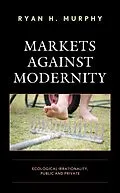In Markets Against Modernity, economist Ryan Murphy documents a clear continuity between the systematic errors people make in their personal lives and the gaps between public opinion and informed opinion. These errors cluster around specific divergences between how the modern world's institutions function-including global markets, pluralistic democracy, and even science itself-and how evolution trained our brains to understand the nature of economic relationships, social relationships, and humanity's relationship to the physical world. Murphy calls these systematic divergences Ecological Irrationality. Exploring them leads him to even more prickly questions-and to conclusions that may challenge the beliefs of those who understand that, for instance, modern vaccines are safe and effective. Do we actually want a less cohesive society? Is doing a task yourself financially prudent? And if we recognize an expert consensus, is there even a way to implement it and achieve the desired effects?
Autorentext
Ryan H. Murphy is senior research fellow at the O'Neil Center for Global Markets and Freedom at Southern Methodist University.
Zusammenfassung
In Markets Against Modernity, economist Ryan Murphy documents a clear continuity between the systematic errors people make in their personal lives and the gaps between public opinion and informed opinion. These errors cluster around specific divergences between how the modern world's institutions functionincluding global markets, pluralistic democracy, and even science itselfand how evolution trained our brains to understand the nature of economic relationships, social relationships, and humanity's relationship to the physical world. Murphy calls these systematic divergences Ecological Irrationality. Exploring them leads him to even more prickly questionsand to conclusions that may challenge the beliefs of those who understand that, for instance, modern vaccines are safe and effective. Do we actually want a less cohesive society? Is doing a task yourself financially prudent? And if we recognize an expert consensus, is there even a way to implement it and achieve the desired effects?
Inhalt
Chapter 1, Trade Is Good
Chapter 2, Extreme Voter Stupidity
Chapter 3, The Obvious and Simple System of Unnatural Liberty
Chapter 4, Ecological Irrationality in the Wild
Chapter 5, Bohemian Status-archy
Chapter 6, Anarchy, State, and Dystopia,
Chapter 7, Too Much Social Capital
Chapter 8, The Poverty of DIYism
Chapter 9, Social Luddism
Chapter 10, Whither Expertise?
